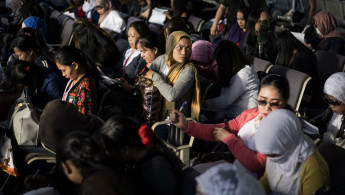Philippines and Kuwait agree on expat protection pact as Manila seeks justice for maid's death
A ban on sending Filipinos to work in Kuwait will remain in place, Manila's labour secretary Silvestre Bello III said in a phone interview, after the sides engaged in two days of talks.
President Rodrigo Duterte says the ban will not be lifted unless Filipinos get better protection in Kuwait and justice is served for Joanna Demafelis, whose death sparked outrage in the Philippines. Bello said earlier that even if a pact was reached, Duterte wanted to see justice served in her case before lifting the ban.
Bello said the pact will be signed at an agreed time and venue in the near future. The last issues to be settled involved the work contracts and the handling of passports of Filipinos in Kuwait, where more than 260,000 work, many as housemaids.
Philippine officials have demanded that housemaids be allowed to hold their passports and mobile phones, which is normal for skilled workers like teachers and office workers. But many Kuwaiti employers seize phones and legal papers, which Bello said prevented maids from rapidly seeking help when they were abused.
Philippine officials have also sought a minimum monthly wage of at least $400 for housemaids.
Demafelis' body was found in the abandoned apartment where she had worked for a Lebanese man and his Syrian wife, both of whom have been arrested. She had likely been dead for more than a year.
Many of the mourners at Demafelis's burial in her central Philippine hometown demanded justice for her.
Her death is one of several that have brought attention to the plight of Filipinos working overseas in sometimes-unsafe environments.
About a tenth of the nation's 100 million people work abroad to provide for families back home. Last year, those workers sent home more than $31 billion, accounting for 10 percent of the country's gross domestic product.





 Follow the Middle East's top stories in English at The New Arab on Google News
Follow the Middle East's top stories in English at The New Arab on Google News
![Israeli forces ordered bombed Gaza's Jabalia, ordering residents to leave [Getty]](/sites/default/files/styles/image_330x185/public/2176418030.jpeg?h=a5f2f23a&itok=_YGZaP1z)

